Criminal Law: Analysis of Defendant's Rights in Criminal Trials
VerifiedAdded on 2023/01/16
|13
|5090
|39
Essay
AI Summary
This essay provides a comprehensive overview of criminal law, focusing on the rights of defendants within the context of criminal trials. It begins by identifying key aspects of criminal law, including the procedures and roles involved when a defendant is accused of an illegal offense. The essay defines critical terms like 'actus reus' and 'mens rea' and explains the legal burden of proof, emphasizing the prosecution's role in presenting evidence. It analyzes the rights of the defendant, such as the right to present their case and access legal representation, and discusses the implications of these rights through case studies like A-G For N. Ireland V Gallagher [1963] AC 349. The essay covers various aspects of criminal trials, including the role of the police, courts, and judges, and concludes with a summary of the importance of criminal law in maintaining justice and protecting citizens' rights. The document is a student's response to an assignment that requires analysis of criminal law principles and the rights of the defendant in the UK legal system.
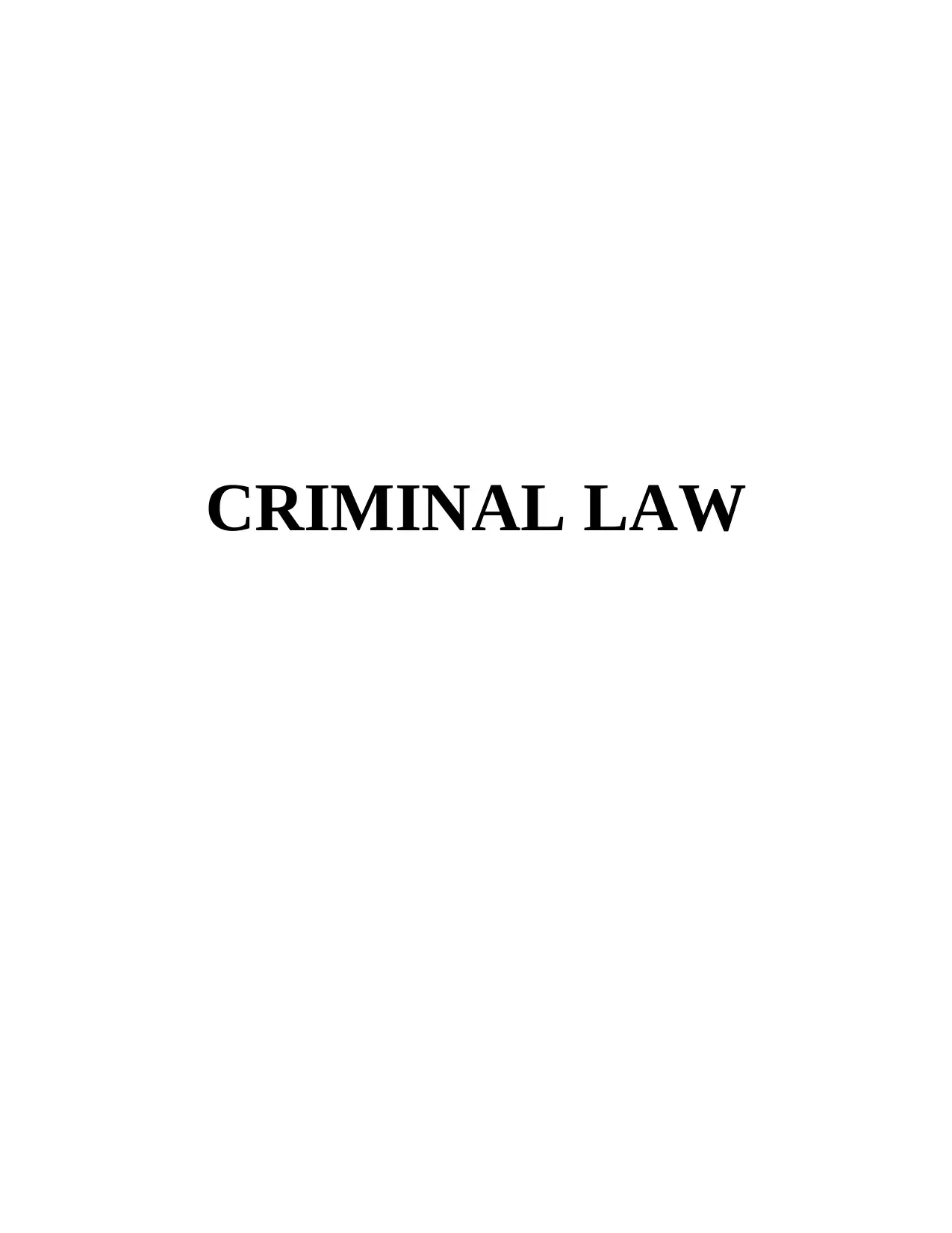
CRIMINAL LAW
Paraphrase This Document
Need a fresh take? Get an instant paraphrase of this document with our AI Paraphraser
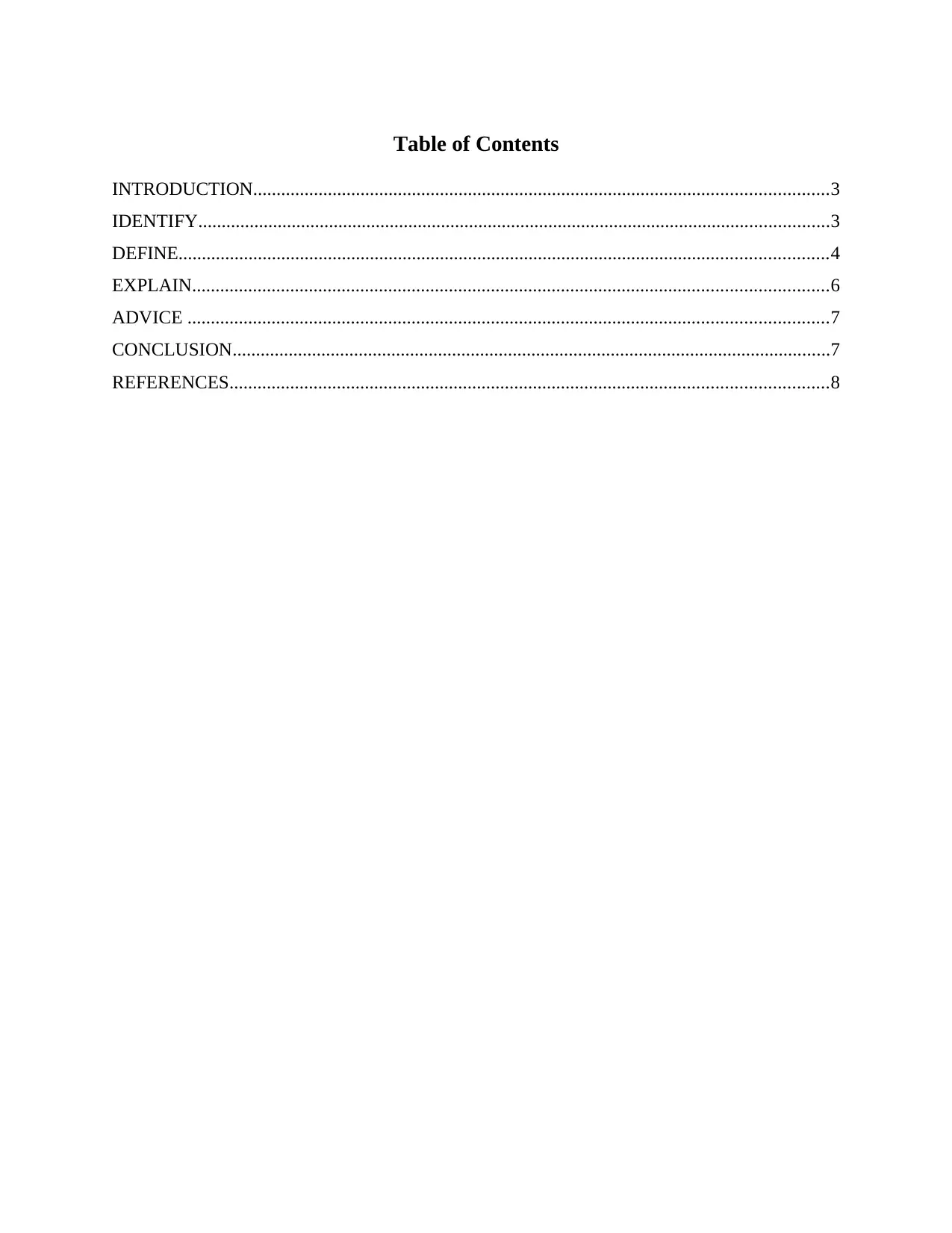
Table of Contents
INTRODUCTION...........................................................................................................................3
IDENTIFY.......................................................................................................................................3
DEFINE...........................................................................................................................................4
EXPLAIN........................................................................................................................................6
ADVICE .........................................................................................................................................7
CONCLUSION................................................................................................................................7
REFERENCES................................................................................................................................8
INTRODUCTION...........................................................................................................................3
IDENTIFY.......................................................................................................................................3
DEFINE...........................................................................................................................................4
EXPLAIN........................................................................................................................................6
ADVICE .........................................................................................................................................7
CONCLUSION................................................................................................................................7
REFERENCES................................................................................................................................8
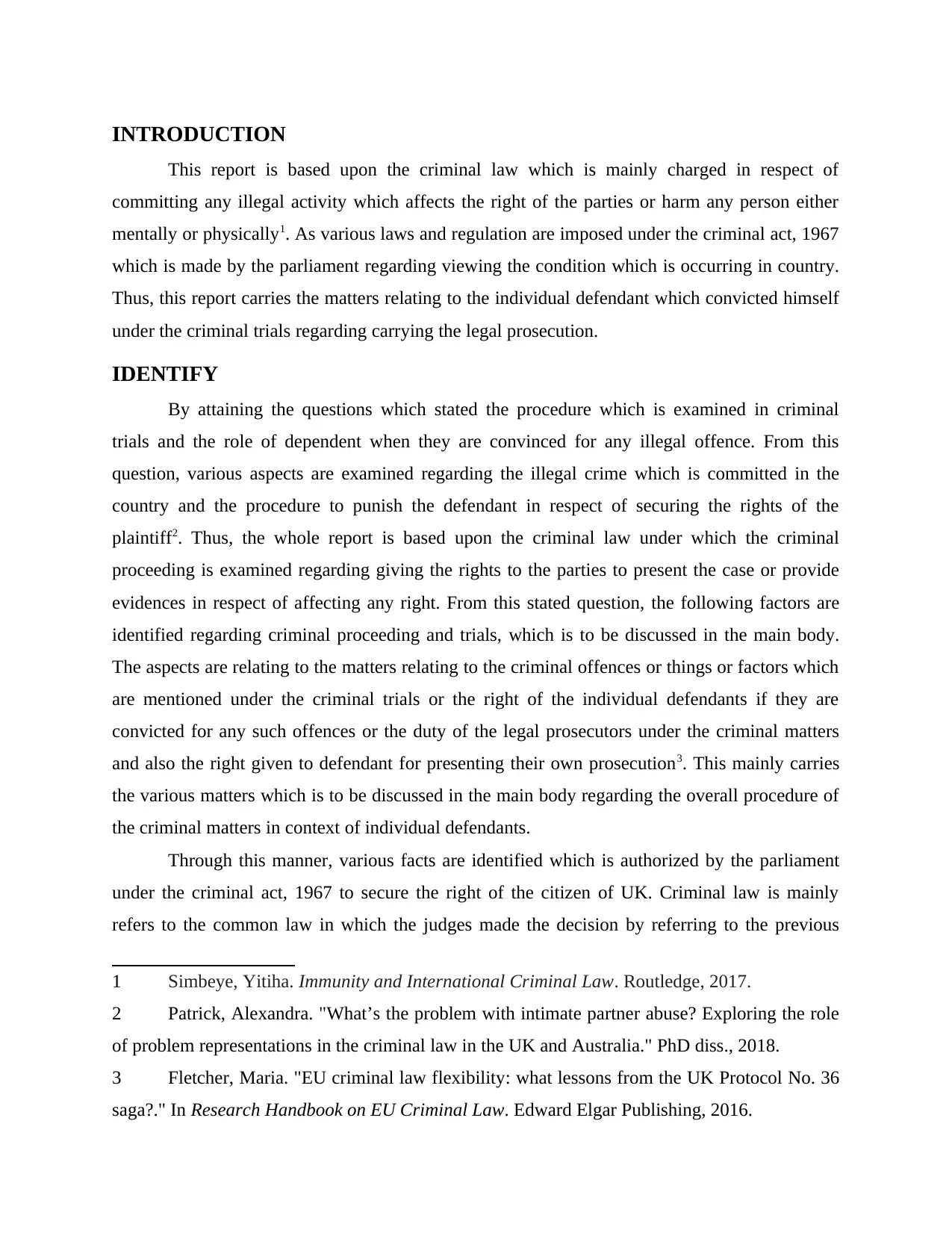
INTRODUCTION
This report is based upon the criminal law which is mainly charged in respect of
committing any illegal activity which affects the right of the parties or harm any person either
mentally or physically1. As various laws and regulation are imposed under the criminal act, 1967
which is made by the parliament regarding viewing the condition which is occurring in country.
Thus, this report carries the matters relating to the individual defendant which convicted himself
under the criminal trials regarding carrying the legal prosecution.
IDENTIFY
By attaining the questions which stated the procedure which is examined in criminal
trials and the role of dependent when they are convinced for any illegal offence. From this
question, various aspects are examined regarding the illegal crime which is committed in the
country and the procedure to punish the defendant in respect of securing the rights of the
plaintiff2. Thus, the whole report is based upon the criminal law under which the criminal
proceeding is examined regarding giving the rights to the parties to present the case or provide
evidences in respect of affecting any right. From this stated question, the following factors are
identified regarding criminal proceeding and trials, which is to be discussed in the main body.
The aspects are relating to the matters relating to the criminal offences or things or factors which
are mentioned under the criminal trials or the right of the individual defendants if they are
convicted for any such offences or the duty of the legal prosecutors under the criminal matters
and also the right given to defendant for presenting their own prosecution3. This mainly carries
the various matters which is to be discussed in the main body regarding the overall procedure of
the criminal matters in context of individual defendants.
Through this manner, various facts are identified which is authorized by the parliament
under the criminal act, 1967 to secure the right of the citizen of UK. Criminal law is mainly
refers to the common law in which the judges made the decision by referring to the previous
1 Simbeye, Yitiha. Immunity and International Criminal Law. Routledge, 2017.
2 Patrick, Alexandra. "What’s the problem with intimate partner abuse? Exploring the role
of problem representations in the criminal law in the UK and Australia." PhD diss., 2018.
3 Fletcher, Maria. "EU criminal law flexibility: what lessons from the UK Protocol No. 36
saga?." In Research Handbook on EU Criminal Law. Edward Elgar Publishing, 2016.
This report is based upon the criminal law which is mainly charged in respect of
committing any illegal activity which affects the right of the parties or harm any person either
mentally or physically1. As various laws and regulation are imposed under the criminal act, 1967
which is made by the parliament regarding viewing the condition which is occurring in country.
Thus, this report carries the matters relating to the individual defendant which convicted himself
under the criminal trials regarding carrying the legal prosecution.
IDENTIFY
By attaining the questions which stated the procedure which is examined in criminal
trials and the role of dependent when they are convinced for any illegal offence. From this
question, various aspects are examined regarding the illegal crime which is committed in the
country and the procedure to punish the defendant in respect of securing the rights of the
plaintiff2. Thus, the whole report is based upon the criminal law under which the criminal
proceeding is examined regarding giving the rights to the parties to present the case or provide
evidences in respect of affecting any right. From this stated question, the following factors are
identified regarding criminal proceeding and trials, which is to be discussed in the main body.
The aspects are relating to the matters relating to the criminal offences or things or factors which
are mentioned under the criminal trials or the right of the individual defendants if they are
convicted for any such offences or the duty of the legal prosecutors under the criminal matters
and also the right given to defendant for presenting their own prosecution3. This mainly carries
the various matters which is to be discussed in the main body regarding the overall procedure of
the criminal matters in context of individual defendants.
Through this manner, various facts are identified which is authorized by the parliament
under the criminal act, 1967 to secure the right of the citizen of UK. Criminal law is mainly
refers to the common law in which the judges made the decision by referring to the previous
1 Simbeye, Yitiha. Immunity and International Criminal Law. Routledge, 2017.
2 Patrick, Alexandra. "What’s the problem with intimate partner abuse? Exploring the role
of problem representations in the criminal law in the UK and Australia." PhD diss., 2018.
3 Fletcher, Maria. "EU criminal law flexibility: what lessons from the UK Protocol No. 36
saga?." In Research Handbook on EU Criminal Law. Edward Elgar Publishing, 2016.
⊘ This is a preview!⊘
Do you want full access?
Subscribe today to unlock all pages.

Trusted by 1+ million students worldwide
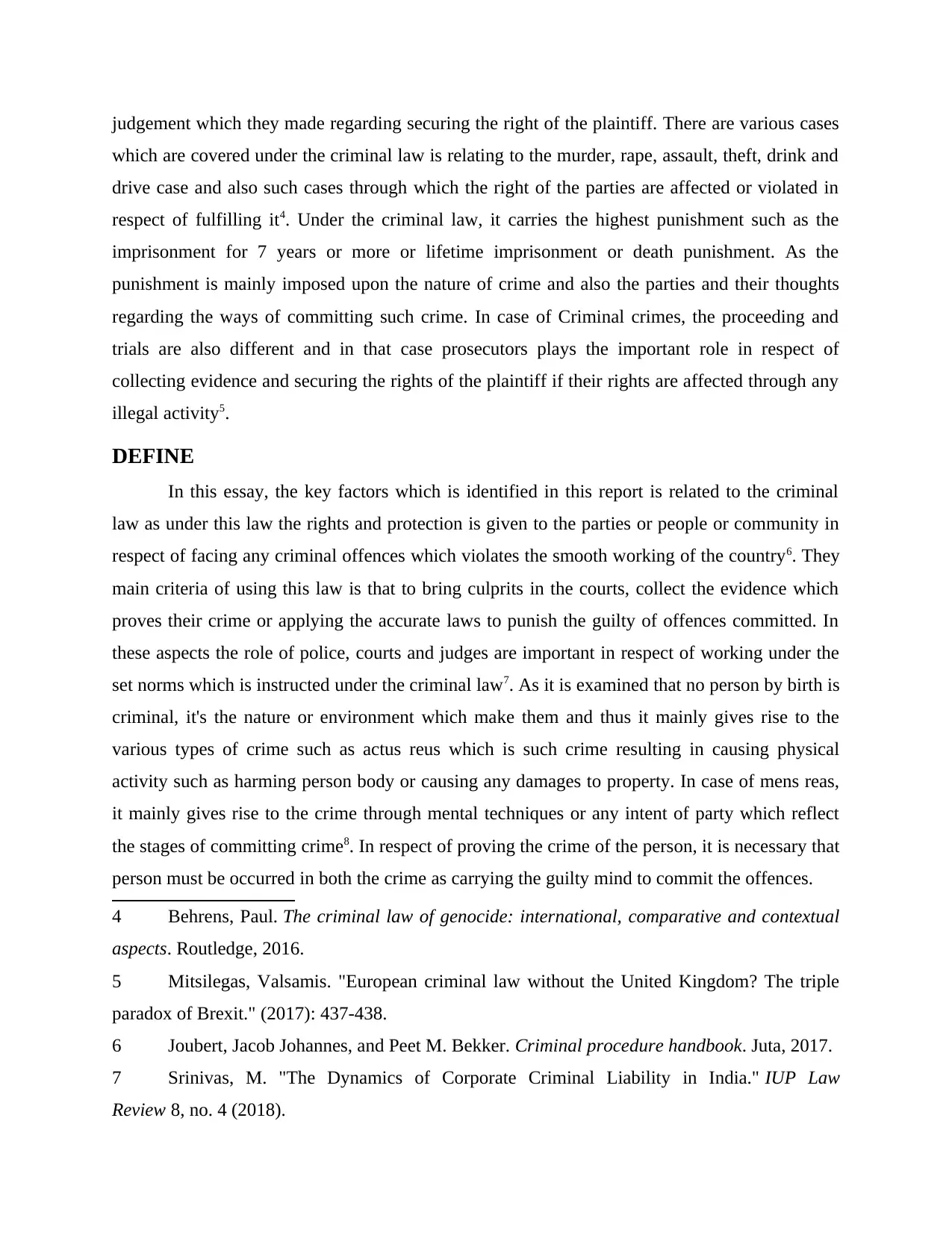
judgement which they made regarding securing the right of the plaintiff. There are various cases
which are covered under the criminal law is relating to the murder, rape, assault, theft, drink and
drive case and also such cases through which the right of the parties are affected or violated in
respect of fulfilling it4. Under the criminal law, it carries the highest punishment such as the
imprisonment for 7 years or more or lifetime imprisonment or death punishment. As the
punishment is mainly imposed upon the nature of crime and also the parties and their thoughts
regarding the ways of committing such crime. In case of Criminal crimes, the proceeding and
trials are also different and in that case prosecutors plays the important role in respect of
collecting evidence and securing the rights of the plaintiff if their rights are affected through any
illegal activity5.
DEFINE
In this essay, the key factors which is identified in this report is related to the criminal
law as under this law the rights and protection is given to the parties or people or community in
respect of facing any criminal offences which violates the smooth working of the country6. They
main criteria of using this law is that to bring culprits in the courts, collect the evidence which
proves their crime or applying the accurate laws to punish the guilty of offences committed. In
these aspects the role of police, courts and judges are important in respect of working under the
set norms which is instructed under the criminal law7. As it is examined that no person by birth is
criminal, it's the nature or environment which make them and thus it mainly gives rise to the
various types of crime such as actus reus which is such crime resulting in causing physical
activity such as harming person body or causing any damages to property. In case of mens reas,
it mainly gives rise to the crime through mental techniques or any intent of party which reflect
the stages of committing crime8. In respect of proving the crime of the person, it is necessary that
person must be occurred in both the crime as carrying the guilty mind to commit the offences.
4 Behrens, Paul. The criminal law of genocide: international, comparative and contextual
aspects. Routledge, 2016.
5 Mitsilegas, Valsamis. "European criminal law without the United Kingdom? The triple
paradox of Brexit." (2017): 437-438.
6 Joubert, Jacob Johannes, and Peet M. Bekker. Criminal procedure handbook. Juta, 2017.
7 Srinivas, M. "The Dynamics of Corporate Criminal Liability in India." IUP Law
Review 8, no. 4 (2018).
which are covered under the criminal law is relating to the murder, rape, assault, theft, drink and
drive case and also such cases through which the right of the parties are affected or violated in
respect of fulfilling it4. Under the criminal law, it carries the highest punishment such as the
imprisonment for 7 years or more or lifetime imprisonment or death punishment. As the
punishment is mainly imposed upon the nature of crime and also the parties and their thoughts
regarding the ways of committing such crime. In case of Criminal crimes, the proceeding and
trials are also different and in that case prosecutors plays the important role in respect of
collecting evidence and securing the rights of the plaintiff if their rights are affected through any
illegal activity5.
DEFINE
In this essay, the key factors which is identified in this report is related to the criminal
law as under this law the rights and protection is given to the parties or people or community in
respect of facing any criminal offences which violates the smooth working of the country6. They
main criteria of using this law is that to bring culprits in the courts, collect the evidence which
proves their crime or applying the accurate laws to punish the guilty of offences committed. In
these aspects the role of police, courts and judges are important in respect of working under the
set norms which is instructed under the criminal law7. As it is examined that no person by birth is
criminal, it's the nature or environment which make them and thus it mainly gives rise to the
various types of crime such as actus reus which is such crime resulting in causing physical
activity such as harming person body or causing any damages to property. In case of mens reas,
it mainly gives rise to the crime through mental techniques or any intent of party which reflect
the stages of committing crime8. In respect of proving the crime of the person, it is necessary that
person must be occurred in both the crime as carrying the guilty mind to commit the offences.
4 Behrens, Paul. The criminal law of genocide: international, comparative and contextual
aspects. Routledge, 2016.
5 Mitsilegas, Valsamis. "European criminal law without the United Kingdom? The triple
paradox of Brexit." (2017): 437-438.
6 Joubert, Jacob Johannes, and Peet M. Bekker. Criminal procedure handbook. Juta, 2017.
7 Srinivas, M. "The Dynamics of Corporate Criminal Liability in India." IUP Law
Review 8, no. 4 (2018).
Paraphrase This Document
Need a fresh take? Get an instant paraphrase of this document with our AI Paraphraser
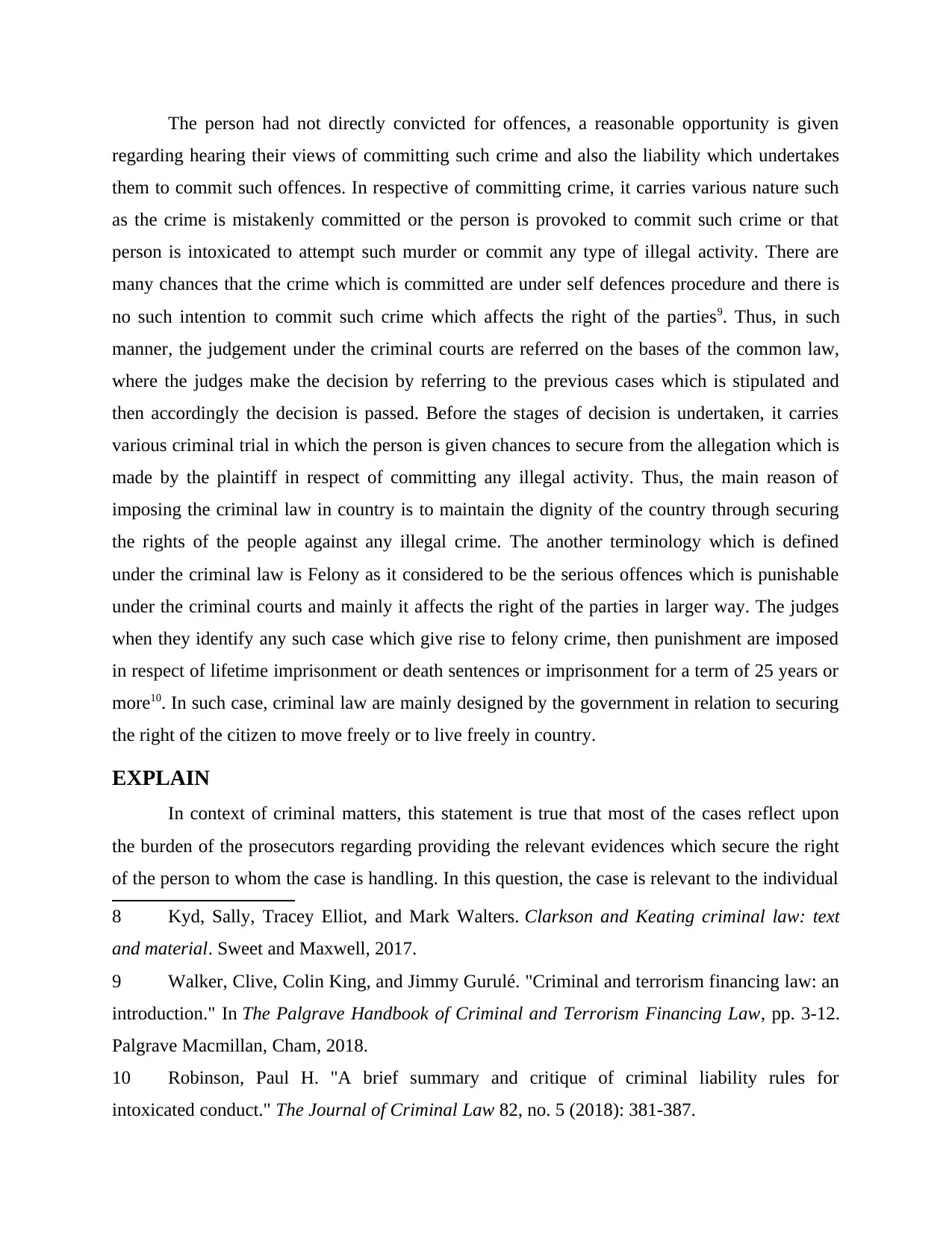
The person had not directly convicted for offences, a reasonable opportunity is given
regarding hearing their views of committing such crime and also the liability which undertakes
them to commit such offences. In respective of committing crime, it carries various nature such
as the crime is mistakenly committed or the person is provoked to commit such crime or that
person is intoxicated to attempt such murder or commit any type of illegal activity. There are
many chances that the crime which is committed are under self defences procedure and there is
no such intention to commit such crime which affects the right of the parties9. Thus, in such
manner, the judgement under the criminal courts are referred on the bases of the common law,
where the judges make the decision by referring to the previous cases which is stipulated and
then accordingly the decision is passed. Before the stages of decision is undertaken, it carries
various criminal trial in which the person is given chances to secure from the allegation which is
made by the plaintiff in respect of committing any illegal activity. Thus, the main reason of
imposing the criminal law in country is to maintain the dignity of the country through securing
the rights of the people against any illegal crime. The another terminology which is defined
under the criminal law is Felony as it considered to be the serious offences which is punishable
under the criminal courts and mainly it affects the right of the parties in larger way. The judges
when they identify any such case which give rise to felony crime, then punishment are imposed
in respect of lifetime imprisonment or death sentences or imprisonment for a term of 25 years or
more10. In such case, criminal law are mainly designed by the government in relation to securing
the right of the citizen to move freely or to live freely in country.
EXPLAIN
In context of criminal matters, this statement is true that most of the cases reflect upon
the burden of the prosecutors regarding providing the relevant evidences which secure the right
of the person to whom the case is handling. In this question, the case is relevant to the individual
8 Kyd, Sally, Tracey Elliot, and Mark Walters. Clarkson and Keating criminal law: text
and material. Sweet and Maxwell, 2017.
9 Walker, Clive, Colin King, and Jimmy Gurulé. "Criminal and terrorism financing law: an
introduction." In The Palgrave Handbook of Criminal and Terrorism Financing Law, pp. 3-12.
Palgrave Macmillan, Cham, 2018.
10 Robinson, Paul H. "A brief summary and critique of criminal liability rules for
intoxicated conduct." The Journal of Criminal Law 82, no. 5 (2018): 381-387.
regarding hearing their views of committing such crime and also the liability which undertakes
them to commit such offences. In respective of committing crime, it carries various nature such
as the crime is mistakenly committed or the person is provoked to commit such crime or that
person is intoxicated to attempt such murder or commit any type of illegal activity. There are
many chances that the crime which is committed are under self defences procedure and there is
no such intention to commit such crime which affects the right of the parties9. Thus, in such
manner, the judgement under the criminal courts are referred on the bases of the common law,
where the judges make the decision by referring to the previous cases which is stipulated and
then accordingly the decision is passed. Before the stages of decision is undertaken, it carries
various criminal trial in which the person is given chances to secure from the allegation which is
made by the plaintiff in respect of committing any illegal activity. Thus, the main reason of
imposing the criminal law in country is to maintain the dignity of the country through securing
the rights of the people against any illegal crime. The another terminology which is defined
under the criminal law is Felony as it considered to be the serious offences which is punishable
under the criminal courts and mainly it affects the right of the parties in larger way. The judges
when they identify any such case which give rise to felony crime, then punishment are imposed
in respect of lifetime imprisonment or death sentences or imprisonment for a term of 25 years or
more10. In such case, criminal law are mainly designed by the government in relation to securing
the right of the citizen to move freely or to live freely in country.
EXPLAIN
In context of criminal matters, this statement is true that most of the cases reflect upon
the burden of the prosecutors regarding providing the relevant evidences which secure the right
of the person to whom the case is handling. In this question, the case is relevant to the individual
8 Kyd, Sally, Tracey Elliot, and Mark Walters. Clarkson and Keating criminal law: text
and material. Sweet and Maxwell, 2017.
9 Walker, Clive, Colin King, and Jimmy Gurulé. "Criminal and terrorism financing law: an
introduction." In The Palgrave Handbook of Criminal and Terrorism Financing Law, pp. 3-12.
Palgrave Macmillan, Cham, 2018.
10 Robinson, Paul H. "A brief summary and critique of criminal liability rules for
intoxicated conduct." The Journal of Criminal Law 82, no. 5 (2018): 381-387.
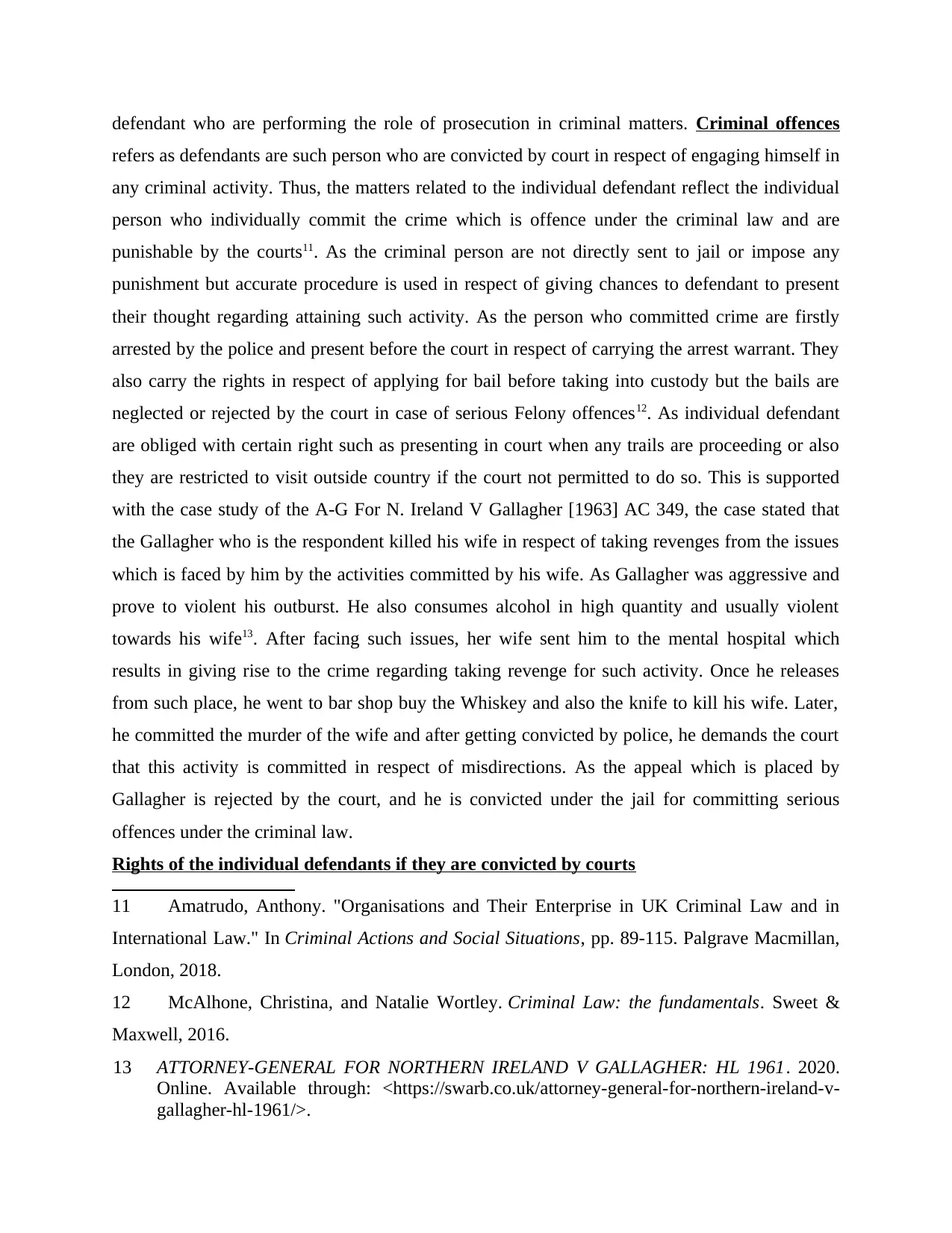
defendant who are performing the role of prosecution in criminal matters. Criminal offences
refers as defendants are such person who are convicted by court in respect of engaging himself in
any criminal activity. Thus, the matters related to the individual defendant reflect the individual
person who individually commit the crime which is offence under the criminal law and are
punishable by the courts11. As the criminal person are not directly sent to jail or impose any
punishment but accurate procedure is used in respect of giving chances to defendant to present
their thought regarding attaining such activity. As the person who committed crime are firstly
arrested by the police and present before the court in respect of carrying the arrest warrant. They
also carry the rights in respect of applying for bail before taking into custody but the bails are
neglected or rejected by the court in case of serious Felony offences12. As individual defendant
are obliged with certain right such as presenting in court when any trails are proceeding or also
they are restricted to visit outside country if the court not permitted to do so. This is supported
with the case study of the A-G For N. Ireland V Gallagher [1963] AC 349, the case stated that
the Gallagher who is the respondent killed his wife in respect of taking revenges from the issues
which is faced by him by the activities committed by his wife. As Gallagher was aggressive and
prove to violent his outburst. He also consumes alcohol in high quantity and usually violent
towards his wife13. After facing such issues, her wife sent him to the mental hospital which
results in giving rise to the crime regarding taking revenge for such activity. Once he releases
from such place, he went to bar shop buy the Whiskey and also the knife to kill his wife. Later,
he committed the murder of the wife and after getting convicted by police, he demands the court
that this activity is committed in respect of misdirections. As the appeal which is placed by
Gallagher is rejected by the court, and he is convicted under the jail for committing serious
offences under the criminal law.
Rights of the individual defendants if they are convicted by courts
11 Amatrudo, Anthony. "Organisations and Their Enterprise in UK Criminal Law and in
International Law." In Criminal Actions and Social Situations, pp. 89-115. Palgrave Macmillan,
London, 2018.
12 McAlhone, Christina, and Natalie Wortley. Criminal Law: the fundamentals. Sweet &
Maxwell, 2016.
13 ATTORNEY-GENERAL FOR NORTHERN IRELAND V GALLAGHER: HL 1961. 2020.
Online. Available through: <https://swarb.co.uk/attorney-general-for-northern-ireland-v-
gallagher-hl-1961/>.
refers as defendants are such person who are convicted by court in respect of engaging himself in
any criminal activity. Thus, the matters related to the individual defendant reflect the individual
person who individually commit the crime which is offence under the criminal law and are
punishable by the courts11. As the criminal person are not directly sent to jail or impose any
punishment but accurate procedure is used in respect of giving chances to defendant to present
their thought regarding attaining such activity. As the person who committed crime are firstly
arrested by the police and present before the court in respect of carrying the arrest warrant. They
also carry the rights in respect of applying for bail before taking into custody but the bails are
neglected or rejected by the court in case of serious Felony offences12. As individual defendant
are obliged with certain right such as presenting in court when any trails are proceeding or also
they are restricted to visit outside country if the court not permitted to do so. This is supported
with the case study of the A-G For N. Ireland V Gallagher [1963] AC 349, the case stated that
the Gallagher who is the respondent killed his wife in respect of taking revenges from the issues
which is faced by him by the activities committed by his wife. As Gallagher was aggressive and
prove to violent his outburst. He also consumes alcohol in high quantity and usually violent
towards his wife13. After facing such issues, her wife sent him to the mental hospital which
results in giving rise to the crime regarding taking revenge for such activity. Once he releases
from such place, he went to bar shop buy the Whiskey and also the knife to kill his wife. Later,
he committed the murder of the wife and after getting convicted by police, he demands the court
that this activity is committed in respect of misdirections. As the appeal which is placed by
Gallagher is rejected by the court, and he is convicted under the jail for committing serious
offences under the criminal law.
Rights of the individual defendants if they are convicted by courts
11 Amatrudo, Anthony. "Organisations and Their Enterprise in UK Criminal Law and in
International Law." In Criminal Actions and Social Situations, pp. 89-115. Palgrave Macmillan,
London, 2018.
12 McAlhone, Christina, and Natalie Wortley. Criminal Law: the fundamentals. Sweet &
Maxwell, 2016.
13 ATTORNEY-GENERAL FOR NORTHERN IRELAND V GALLAGHER: HL 1961. 2020.
Online. Available through: <https://swarb.co.uk/attorney-general-for-northern-ireland-v-
gallagher-hl-1961/>.
⊘ This is a preview!⊘
Do you want full access?
Subscribe today to unlock all pages.

Trusted by 1+ million students worldwide
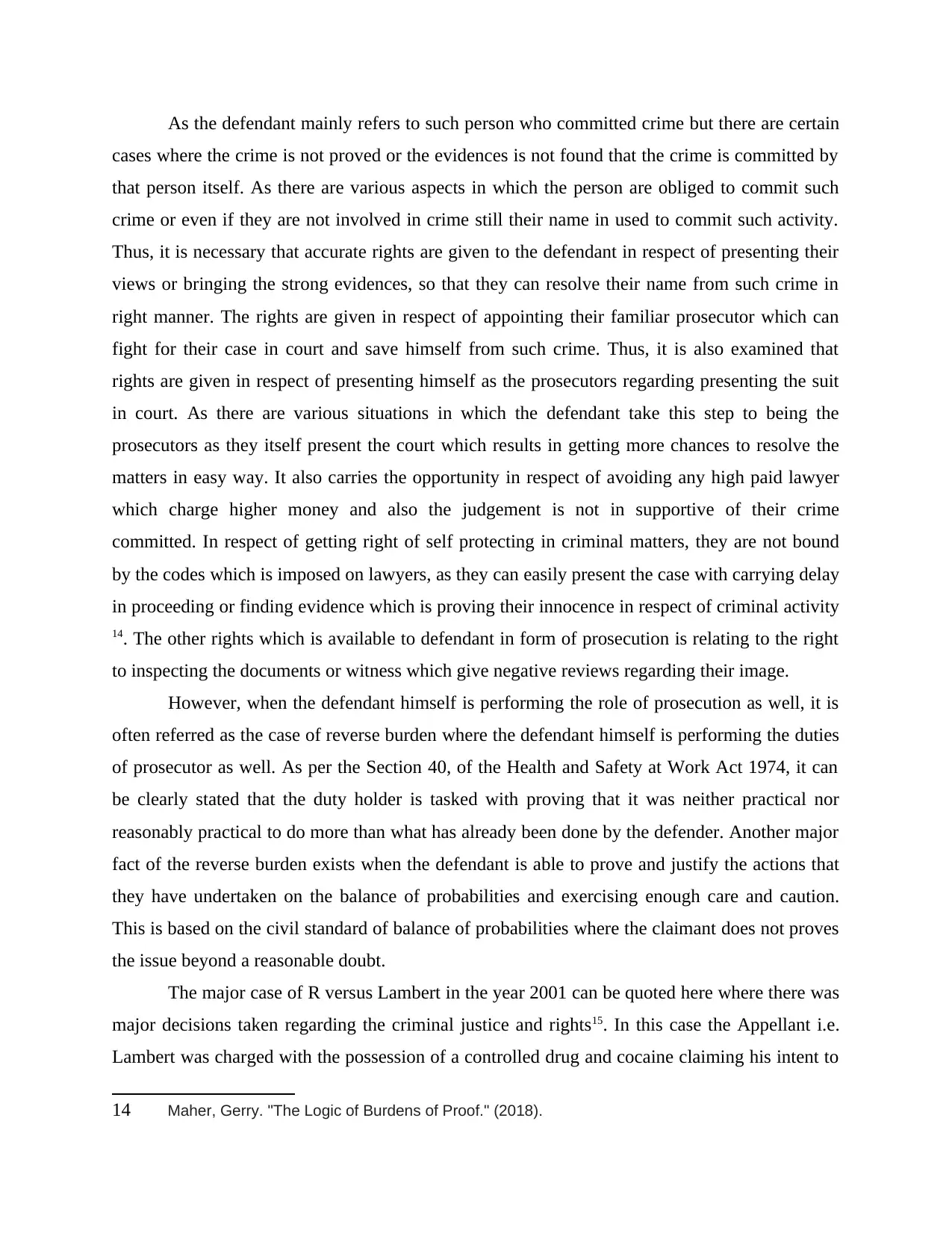
As the defendant mainly refers to such person who committed crime but there are certain
cases where the crime is not proved or the evidences is not found that the crime is committed by
that person itself. As there are various aspects in which the person are obliged to commit such
crime or even if they are not involved in crime still their name in used to commit such activity.
Thus, it is necessary that accurate rights are given to the defendant in respect of presenting their
views or bringing the strong evidences, so that they can resolve their name from such crime in
right manner. The rights are given in respect of appointing their familiar prosecutor which can
fight for their case in court and save himself from such crime. Thus, it is also examined that
rights are given in respect of presenting himself as the prosecutors regarding presenting the suit
in court. As there are various situations in which the defendant take this step to being the
prosecutors as they itself present the court which results in getting more chances to resolve the
matters in easy way. It also carries the opportunity in respect of avoiding any high paid lawyer
which charge higher money and also the judgement is not in supportive of their crime
committed. In respect of getting right of self protecting in criminal matters, they are not bound
by the codes which is imposed on lawyers, as they can easily present the case with carrying delay
in proceeding or finding evidence which is proving their innocence in respect of criminal activity
14. The other rights which is available to defendant in form of prosecution is relating to the right
to inspecting the documents or witness which give negative reviews regarding their image.
However, when the defendant himself is performing the role of prosecution as well, it is
often referred as the case of reverse burden where the defendant himself is performing the duties
of prosecutor as well. As per the Section 40, of the Health and Safety at Work Act 1974, it can
be clearly stated that the duty holder is tasked with proving that it was neither practical nor
reasonably practical to do more than what has already been done by the defender. Another major
fact of the reverse burden exists when the defendant is able to prove and justify the actions that
they have undertaken on the balance of probabilities and exercising enough care and caution.
This is based on the civil standard of balance of probabilities where the claimant does not proves
the issue beyond a reasonable doubt.
The major case of R versus Lambert in the year 2001 can be quoted here where there was
major decisions taken regarding the criminal justice and rights15. In this case the Appellant i.e.
Lambert was charged with the possession of a controlled drug and cocaine claiming his intent to
14 Maher, Gerry. "The Logic of Burdens of Proof." (2018).
cases where the crime is not proved or the evidences is not found that the crime is committed by
that person itself. As there are various aspects in which the person are obliged to commit such
crime or even if they are not involved in crime still their name in used to commit such activity.
Thus, it is necessary that accurate rights are given to the defendant in respect of presenting their
views or bringing the strong evidences, so that they can resolve their name from such crime in
right manner. The rights are given in respect of appointing their familiar prosecutor which can
fight for their case in court and save himself from such crime. Thus, it is also examined that
rights are given in respect of presenting himself as the prosecutors regarding presenting the suit
in court. As there are various situations in which the defendant take this step to being the
prosecutors as they itself present the court which results in getting more chances to resolve the
matters in easy way. It also carries the opportunity in respect of avoiding any high paid lawyer
which charge higher money and also the judgement is not in supportive of their crime
committed. In respect of getting right of self protecting in criminal matters, they are not bound
by the codes which is imposed on lawyers, as they can easily present the case with carrying delay
in proceeding or finding evidence which is proving their innocence in respect of criminal activity
14. The other rights which is available to defendant in form of prosecution is relating to the right
to inspecting the documents or witness which give negative reviews regarding their image.
However, when the defendant himself is performing the role of prosecution as well, it is
often referred as the case of reverse burden where the defendant himself is performing the duties
of prosecutor as well. As per the Section 40, of the Health and Safety at Work Act 1974, it can
be clearly stated that the duty holder is tasked with proving that it was neither practical nor
reasonably practical to do more than what has already been done by the defender. Another major
fact of the reverse burden exists when the defendant is able to prove and justify the actions that
they have undertaken on the balance of probabilities and exercising enough care and caution.
This is based on the civil standard of balance of probabilities where the claimant does not proves
the issue beyond a reasonable doubt.
The major case of R versus Lambert in the year 2001 can be quoted here where there was
major decisions taken regarding the criminal justice and rights15. In this case the Appellant i.e.
Lambert was charged with the possession of a controlled drug and cocaine claiming his intent to
14 Maher, Gerry. "The Logic of Burdens of Proof." (2018).
Paraphrase This Document
Need a fresh take? Get an instant paraphrase of this document with our AI Paraphraser
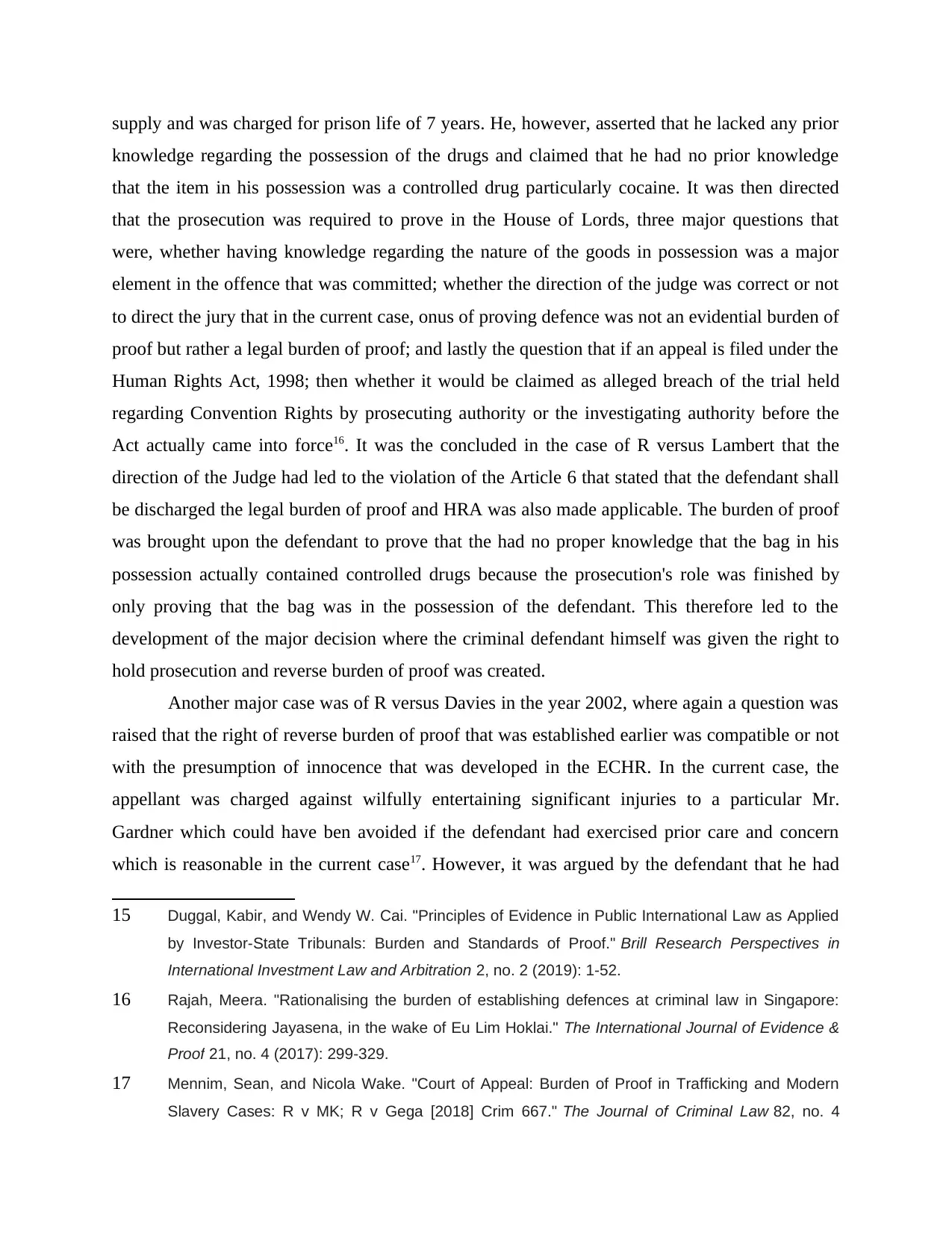
supply and was charged for prison life of 7 years. He, however, asserted that he lacked any prior
knowledge regarding the possession of the drugs and claimed that he had no prior knowledge
that the item in his possession was a controlled drug particularly cocaine. It was then directed
that the prosecution was required to prove in the House of Lords, three major questions that
were, whether having knowledge regarding the nature of the goods in possession was a major
element in the offence that was committed; whether the direction of the judge was correct or not
to direct the jury that in the current case, onus of proving defence was not an evidential burden of
proof but rather a legal burden of proof; and lastly the question that if an appeal is filed under the
Human Rights Act, 1998; then whether it would be claimed as alleged breach of the trial held
regarding Convention Rights by prosecuting authority or the investigating authority before the
Act actually came into force16. It was the concluded in the case of R versus Lambert that the
direction of the Judge had led to the violation of the Article 6 that stated that the defendant shall
be discharged the legal burden of proof and HRA was also made applicable. The burden of proof
was brought upon the defendant to prove that the had no proper knowledge that the bag in his
possession actually contained controlled drugs because the prosecution's role was finished by
only proving that the bag was in the possession of the defendant. This therefore led to the
development of the major decision where the criminal defendant himself was given the right to
hold prosecution and reverse burden of proof was created.
Another major case was of R versus Davies in the year 2002, where again a question was
raised that the right of reverse burden of proof that was established earlier was compatible or not
with the presumption of innocence that was developed in the ECHR. In the current case, the
appellant was charged against wilfully entertaining significant injuries to a particular Mr.
Gardner which could have ben avoided if the defendant had exercised prior care and concern
which is reasonable in the current case17. However, it was argued by the defendant that he had
15 Duggal, Kabir, and Wendy W. Cai. "Principles of Evidence in Public International Law as Applied
by Investor-State Tribunals: Burden and Standards of Proof." Brill Research Perspectives in
International Investment Law and Arbitration 2, no. 2 (2019): 1-52.
16 Rajah, Meera. "Rationalising the burden of establishing defences at criminal law in Singapore:
Reconsidering Jayasena, in the wake of Eu Lim Hoklai." The International Journal of Evidence &
Proof 21, no. 4 (2017): 299-329.
17 Mennim, Sean, and Nicola Wake. "Court of Appeal: Burden of Proof in Trafficking and Modern
Slavery Cases: R v MK; R v Gega [2018] Crim 667." The Journal of Criminal Law 82, no. 4
knowledge regarding the possession of the drugs and claimed that he had no prior knowledge
that the item in his possession was a controlled drug particularly cocaine. It was then directed
that the prosecution was required to prove in the House of Lords, three major questions that
were, whether having knowledge regarding the nature of the goods in possession was a major
element in the offence that was committed; whether the direction of the judge was correct or not
to direct the jury that in the current case, onus of proving defence was not an evidential burden of
proof but rather a legal burden of proof; and lastly the question that if an appeal is filed under the
Human Rights Act, 1998; then whether it would be claimed as alleged breach of the trial held
regarding Convention Rights by prosecuting authority or the investigating authority before the
Act actually came into force16. It was the concluded in the case of R versus Lambert that the
direction of the Judge had led to the violation of the Article 6 that stated that the defendant shall
be discharged the legal burden of proof and HRA was also made applicable. The burden of proof
was brought upon the defendant to prove that the had no proper knowledge that the bag in his
possession actually contained controlled drugs because the prosecution's role was finished by
only proving that the bag was in the possession of the defendant. This therefore led to the
development of the major decision where the criminal defendant himself was given the right to
hold prosecution and reverse burden of proof was created.
Another major case was of R versus Davies in the year 2002, where again a question was
raised that the right of reverse burden of proof that was established earlier was compatible or not
with the presumption of innocence that was developed in the ECHR. In the current case, the
appellant was charged against wilfully entertaining significant injuries to a particular Mr.
Gardner which could have ben avoided if the defendant had exercised prior care and concern
which is reasonable in the current case17. However, it was argued by the defendant that he had
15 Duggal, Kabir, and Wendy W. Cai. "Principles of Evidence in Public International Law as Applied
by Investor-State Tribunals: Burden and Standards of Proof." Brill Research Perspectives in
International Investment Law and Arbitration 2, no. 2 (2019): 1-52.
16 Rajah, Meera. "Rationalising the burden of establishing defences at criminal law in Singapore:
Reconsidering Jayasena, in the wake of Eu Lim Hoklai." The International Journal of Evidence &
Proof 21, no. 4 (2017): 299-329.
17 Mennim, Sean, and Nicola Wake. "Court of Appeal: Burden of Proof in Trafficking and Modern
Slavery Cases: R v MK; R v Gega [2018] Crim 667." The Journal of Criminal Law 82, no. 4
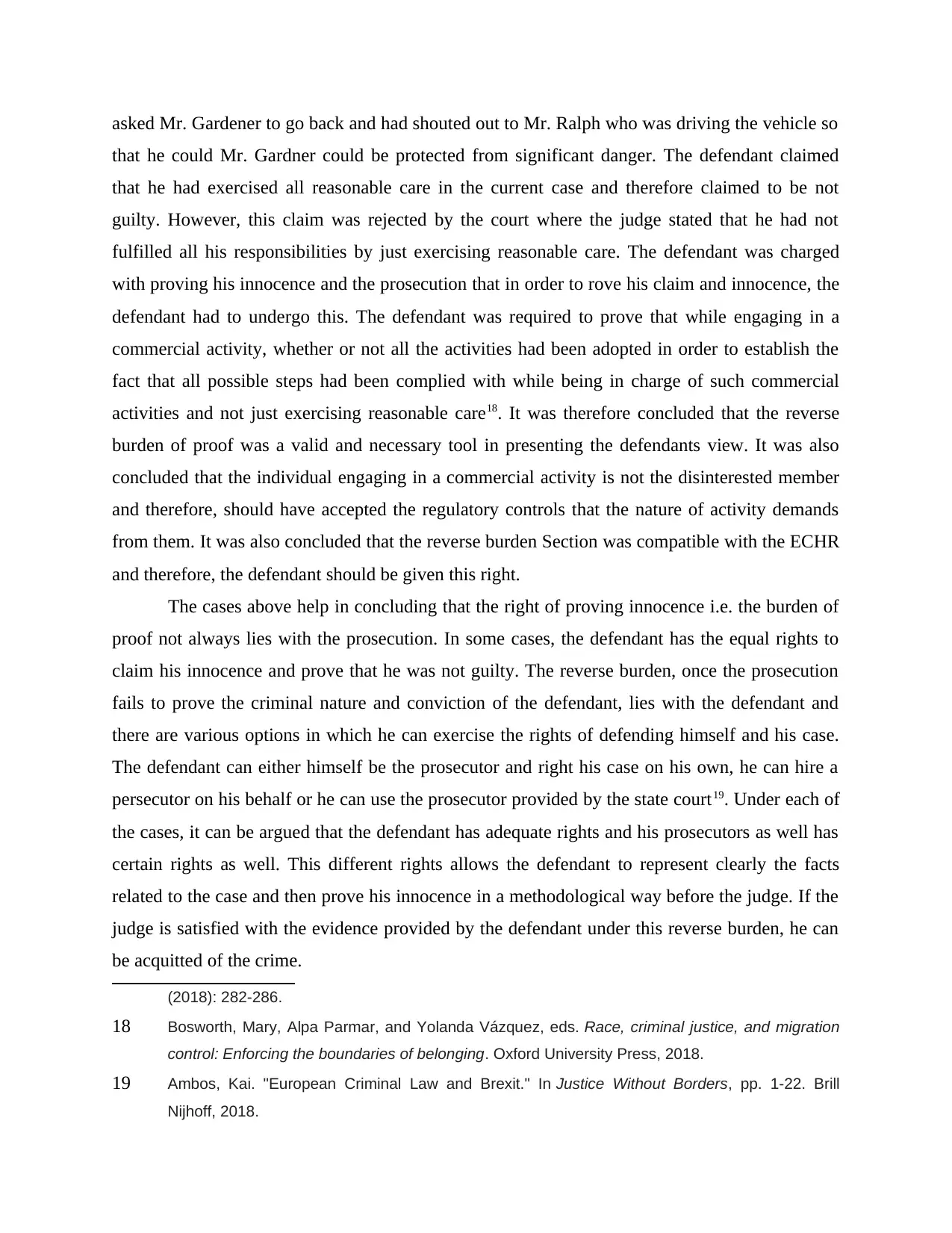
asked Mr. Gardener to go back and had shouted out to Mr. Ralph who was driving the vehicle so
that he could Mr. Gardner could be protected from significant danger. The defendant claimed
that he had exercised all reasonable care in the current case and therefore claimed to be not
guilty. However, this claim was rejected by the court where the judge stated that he had not
fulfilled all his responsibilities by just exercising reasonable care. The defendant was charged
with proving his innocence and the prosecution that in order to rove his claim and innocence, the
defendant had to undergo this. The defendant was required to prove that while engaging in a
commercial activity, whether or not all the activities had been adopted in order to establish the
fact that all possible steps had been complied with while being in charge of such commercial
activities and not just exercising reasonable care18. It was therefore concluded that the reverse
burden of proof was a valid and necessary tool in presenting the defendants view. It was also
concluded that the individual engaging in a commercial activity is not the disinterested member
and therefore, should have accepted the regulatory controls that the nature of activity demands
from them. It was also concluded that the reverse burden Section was compatible with the ECHR
and therefore, the defendant should be given this right.
The cases above help in concluding that the right of proving innocence i.e. the burden of
proof not always lies with the prosecution. In some cases, the defendant has the equal rights to
claim his innocence and prove that he was not guilty. The reverse burden, once the prosecution
fails to prove the criminal nature and conviction of the defendant, lies with the defendant and
there are various options in which he can exercise the rights of defending himself and his case.
The defendant can either himself be the prosecutor and right his case on his own, he can hire a
persecutor on his behalf or he can use the prosecutor provided by the state court19. Under each of
the cases, it can be argued that the defendant has adequate rights and his prosecutors as well has
certain rights as well. This different rights allows the defendant to represent clearly the facts
related to the case and then prove his innocence in a methodological way before the judge. If the
judge is satisfied with the evidence provided by the defendant under this reverse burden, he can
be acquitted of the crime.
(2018): 282-286.
18 Bosworth, Mary, Alpa Parmar, and Yolanda Vázquez, eds. Race, criminal justice, and migration
control: Enforcing the boundaries of belonging. Oxford University Press, 2018.
19 Ambos, Kai. "European Criminal Law and Brexit." In Justice Without Borders, pp. 1-22. Brill
Nijhoff, 2018.
that he could Mr. Gardner could be protected from significant danger. The defendant claimed
that he had exercised all reasonable care in the current case and therefore claimed to be not
guilty. However, this claim was rejected by the court where the judge stated that he had not
fulfilled all his responsibilities by just exercising reasonable care. The defendant was charged
with proving his innocence and the prosecution that in order to rove his claim and innocence, the
defendant had to undergo this. The defendant was required to prove that while engaging in a
commercial activity, whether or not all the activities had been adopted in order to establish the
fact that all possible steps had been complied with while being in charge of such commercial
activities and not just exercising reasonable care18. It was therefore concluded that the reverse
burden of proof was a valid and necessary tool in presenting the defendants view. It was also
concluded that the individual engaging in a commercial activity is not the disinterested member
and therefore, should have accepted the regulatory controls that the nature of activity demands
from them. It was also concluded that the reverse burden Section was compatible with the ECHR
and therefore, the defendant should be given this right.
The cases above help in concluding that the right of proving innocence i.e. the burden of
proof not always lies with the prosecution. In some cases, the defendant has the equal rights to
claim his innocence and prove that he was not guilty. The reverse burden, once the prosecution
fails to prove the criminal nature and conviction of the defendant, lies with the defendant and
there are various options in which he can exercise the rights of defending himself and his case.
The defendant can either himself be the prosecutor and right his case on his own, he can hire a
persecutor on his behalf or he can use the prosecutor provided by the state court19. Under each of
the cases, it can be argued that the defendant has adequate rights and his prosecutors as well has
certain rights as well. This different rights allows the defendant to represent clearly the facts
related to the case and then prove his innocence in a methodological way before the judge. If the
judge is satisfied with the evidence provided by the defendant under this reverse burden, he can
be acquitted of the crime.
(2018): 282-286.
18 Bosworth, Mary, Alpa Parmar, and Yolanda Vázquez, eds. Race, criminal justice, and migration
control: Enforcing the boundaries of belonging. Oxford University Press, 2018.
19 Ambos, Kai. "European Criminal Law and Brexit." In Justice Without Borders, pp. 1-22. Brill
Nijhoff, 2018.
⊘ This is a preview!⊘
Do you want full access?
Subscribe today to unlock all pages.

Trusted by 1+ million students worldwide
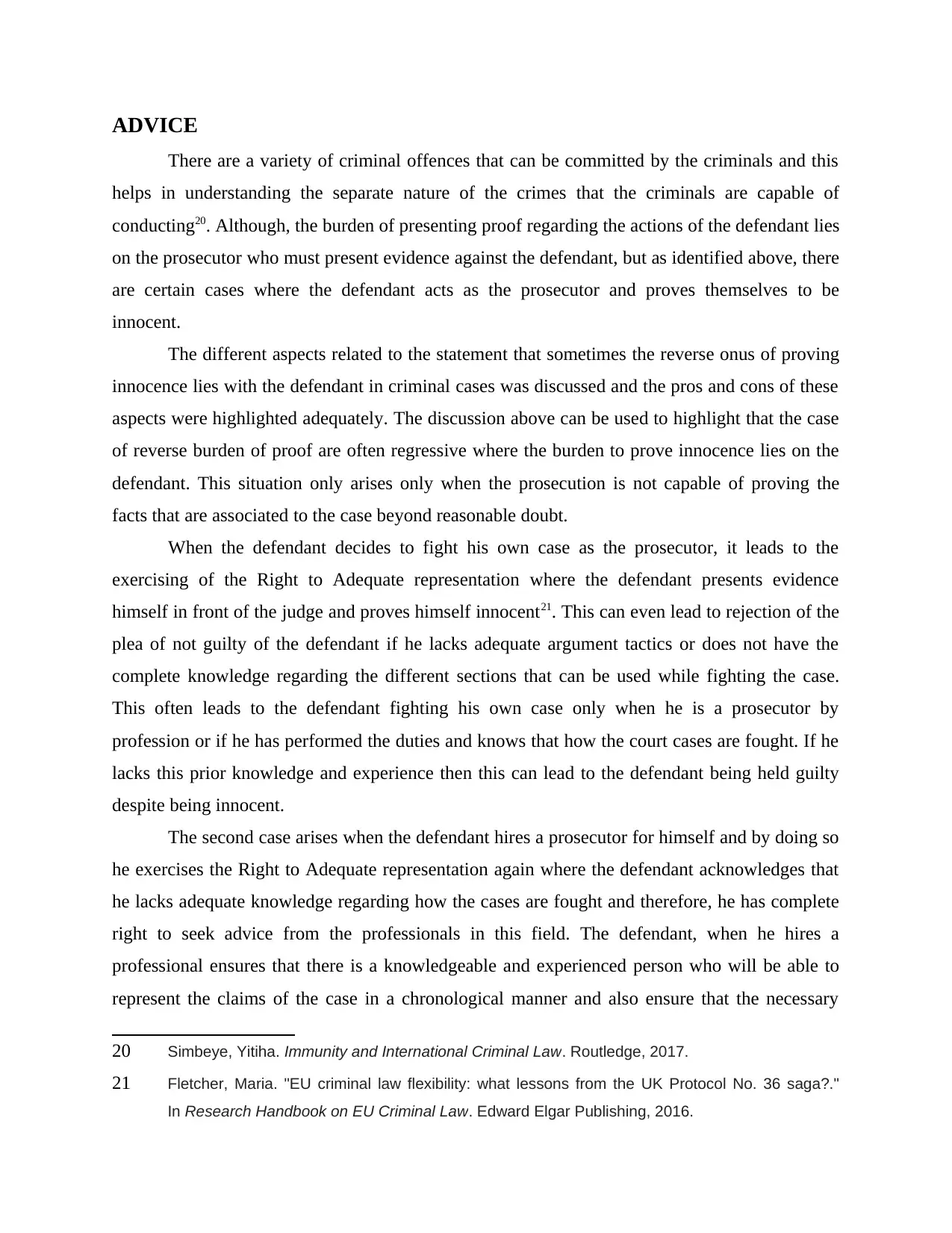
ADVICE
There are a variety of criminal offences that can be committed by the criminals and this
helps in understanding the separate nature of the crimes that the criminals are capable of
conducting20. Although, the burden of presenting proof regarding the actions of the defendant lies
on the prosecutor who must present evidence against the defendant, but as identified above, there
are certain cases where the defendant acts as the prosecutor and proves themselves to be
innocent.
The different aspects related to the statement that sometimes the reverse onus of proving
innocence lies with the defendant in criminal cases was discussed and the pros and cons of these
aspects were highlighted adequately. The discussion above can be used to highlight that the case
of reverse burden of proof are often regressive where the burden to prove innocence lies on the
defendant. This situation only arises only when the prosecution is not capable of proving the
facts that are associated to the case beyond reasonable doubt.
When the defendant decides to fight his own case as the prosecutor, it leads to the
exercising of the Right to Adequate representation where the defendant presents evidence
himself in front of the judge and proves himself innocent21. This can even lead to rejection of the
plea of not guilty of the defendant if he lacks adequate argument tactics or does not have the
complete knowledge regarding the different sections that can be used while fighting the case.
This often leads to the defendant fighting his own case only when he is a prosecutor by
profession or if he has performed the duties and knows that how the court cases are fought. If he
lacks this prior knowledge and experience then this can lead to the defendant being held guilty
despite being innocent.
The second case arises when the defendant hires a prosecutor for himself and by doing so
he exercises the Right to Adequate representation again where the defendant acknowledges that
he lacks adequate knowledge regarding how the cases are fought and therefore, he has complete
right to seek advice from the professionals in this field. The defendant, when he hires a
professional ensures that there is a knowledgeable and experienced person who will be able to
represent the claims of the case in a chronological manner and also ensure that the necessary
20 Simbeye, Yitiha. Immunity and International Criminal Law. Routledge, 2017.
21 Fletcher, Maria. "EU criminal law flexibility: what lessons from the UK Protocol No. 36 saga?."
In Research Handbook on EU Criminal Law. Edward Elgar Publishing, 2016.
There are a variety of criminal offences that can be committed by the criminals and this
helps in understanding the separate nature of the crimes that the criminals are capable of
conducting20. Although, the burden of presenting proof regarding the actions of the defendant lies
on the prosecutor who must present evidence against the defendant, but as identified above, there
are certain cases where the defendant acts as the prosecutor and proves themselves to be
innocent.
The different aspects related to the statement that sometimes the reverse onus of proving
innocence lies with the defendant in criminal cases was discussed and the pros and cons of these
aspects were highlighted adequately. The discussion above can be used to highlight that the case
of reverse burden of proof are often regressive where the burden to prove innocence lies on the
defendant. This situation only arises only when the prosecution is not capable of proving the
facts that are associated to the case beyond reasonable doubt.
When the defendant decides to fight his own case as the prosecutor, it leads to the
exercising of the Right to Adequate representation where the defendant presents evidence
himself in front of the judge and proves himself innocent21. This can even lead to rejection of the
plea of not guilty of the defendant if he lacks adequate argument tactics or does not have the
complete knowledge regarding the different sections that can be used while fighting the case.
This often leads to the defendant fighting his own case only when he is a prosecutor by
profession or if he has performed the duties and knows that how the court cases are fought. If he
lacks this prior knowledge and experience then this can lead to the defendant being held guilty
despite being innocent.
The second case arises when the defendant hires a prosecutor for himself and by doing so
he exercises the Right to Adequate representation again where the defendant acknowledges that
he lacks adequate knowledge regarding how the cases are fought and therefore, he has complete
right to seek advice from the professionals in this field. The defendant, when he hires a
professional ensures that there is a knowledgeable and experienced person who will be able to
represent the claims of the case in a chronological manner and also ensure that the necessary
20 Simbeye, Yitiha. Immunity and International Criminal Law. Routledge, 2017.
21 Fletcher, Maria. "EU criminal law flexibility: what lessons from the UK Protocol No. 36 saga?."
In Research Handbook on EU Criminal Law. Edward Elgar Publishing, 2016.
Paraphrase This Document
Need a fresh take? Get an instant paraphrase of this document with our AI Paraphraser
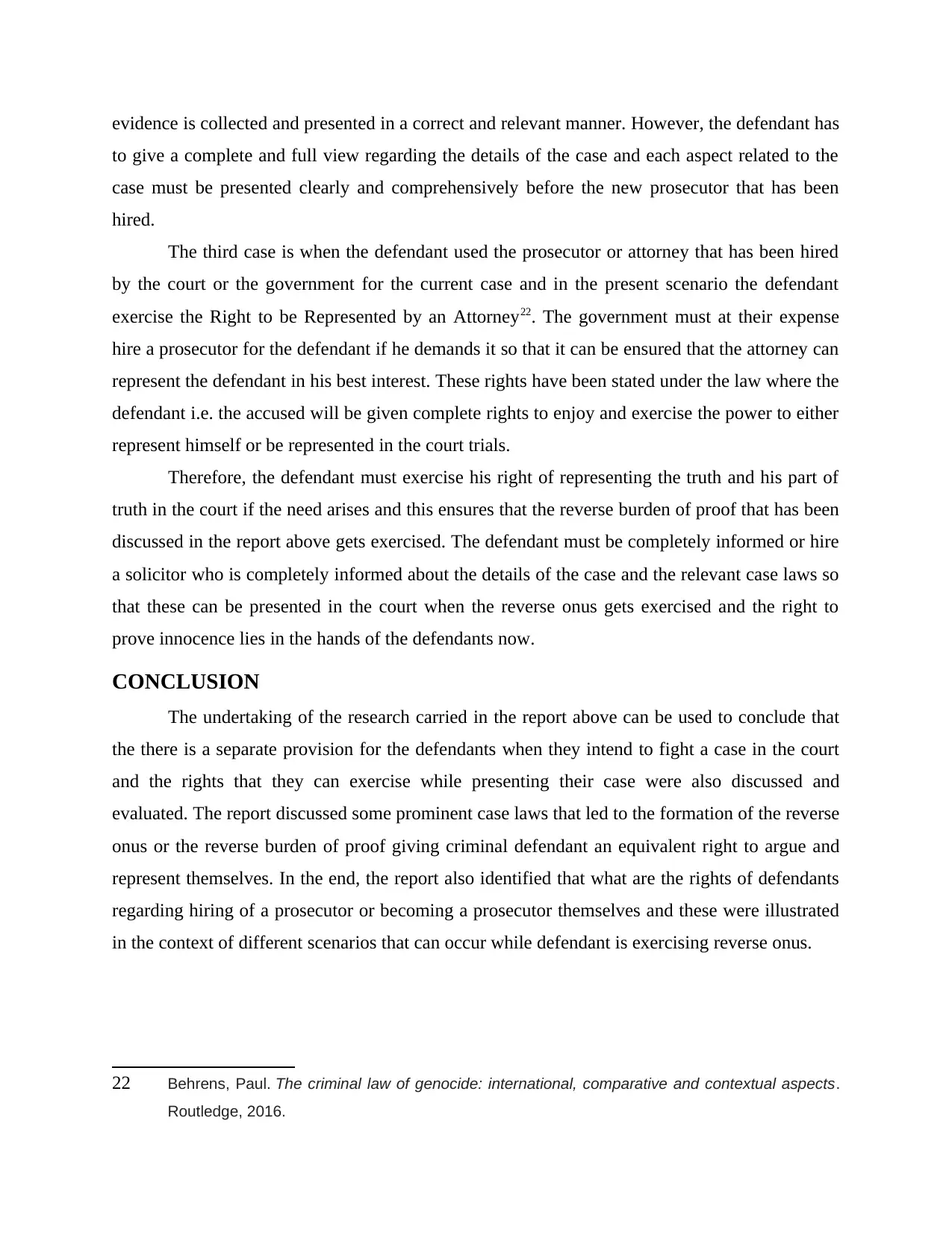
evidence is collected and presented in a correct and relevant manner. However, the defendant has
to give a complete and full view regarding the details of the case and each aspect related to the
case must be presented clearly and comprehensively before the new prosecutor that has been
hired.
The third case is when the defendant used the prosecutor or attorney that has been hired
by the court or the government for the current case and in the present scenario the defendant
exercise the Right to be Represented by an Attorney22. The government must at their expense
hire a prosecutor for the defendant if he demands it so that it can be ensured that the attorney can
represent the defendant in his best interest. These rights have been stated under the law where the
defendant i.e. the accused will be given complete rights to enjoy and exercise the power to either
represent himself or be represented in the court trials.
Therefore, the defendant must exercise his right of representing the truth and his part of
truth in the court if the need arises and this ensures that the reverse burden of proof that has been
discussed in the report above gets exercised. The defendant must be completely informed or hire
a solicitor who is completely informed about the details of the case and the relevant case laws so
that these can be presented in the court when the reverse onus gets exercised and the right to
prove innocence lies in the hands of the defendants now.
CONCLUSION
The undertaking of the research carried in the report above can be used to conclude that
the there is a separate provision for the defendants when they intend to fight a case in the court
and the rights that they can exercise while presenting their case were also discussed and
evaluated. The report discussed some prominent case laws that led to the formation of the reverse
onus or the reverse burden of proof giving criminal defendant an equivalent right to argue and
represent themselves. In the end, the report also identified that what are the rights of defendants
regarding hiring of a prosecutor or becoming a prosecutor themselves and these were illustrated
in the context of different scenarios that can occur while defendant is exercising reverse onus.
22 Behrens, Paul. The criminal law of genocide: international, comparative and contextual aspects.
Routledge, 2016.
to give a complete and full view regarding the details of the case and each aspect related to the
case must be presented clearly and comprehensively before the new prosecutor that has been
hired.
The third case is when the defendant used the prosecutor or attorney that has been hired
by the court or the government for the current case and in the present scenario the defendant
exercise the Right to be Represented by an Attorney22. The government must at their expense
hire a prosecutor for the defendant if he demands it so that it can be ensured that the attorney can
represent the defendant in his best interest. These rights have been stated under the law where the
defendant i.e. the accused will be given complete rights to enjoy and exercise the power to either
represent himself or be represented in the court trials.
Therefore, the defendant must exercise his right of representing the truth and his part of
truth in the court if the need arises and this ensures that the reverse burden of proof that has been
discussed in the report above gets exercised. The defendant must be completely informed or hire
a solicitor who is completely informed about the details of the case and the relevant case laws so
that these can be presented in the court when the reverse onus gets exercised and the right to
prove innocence lies in the hands of the defendants now.
CONCLUSION
The undertaking of the research carried in the report above can be used to conclude that
the there is a separate provision for the defendants when they intend to fight a case in the court
and the rights that they can exercise while presenting their case were also discussed and
evaluated. The report discussed some prominent case laws that led to the formation of the reverse
onus or the reverse burden of proof giving criminal defendant an equivalent right to argue and
represent themselves. In the end, the report also identified that what are the rights of defendants
regarding hiring of a prosecutor or becoming a prosecutor themselves and these were illustrated
in the context of different scenarios that can occur while defendant is exercising reverse onus.
22 Behrens, Paul. The criminal law of genocide: international, comparative and contextual aspects.
Routledge, 2016.
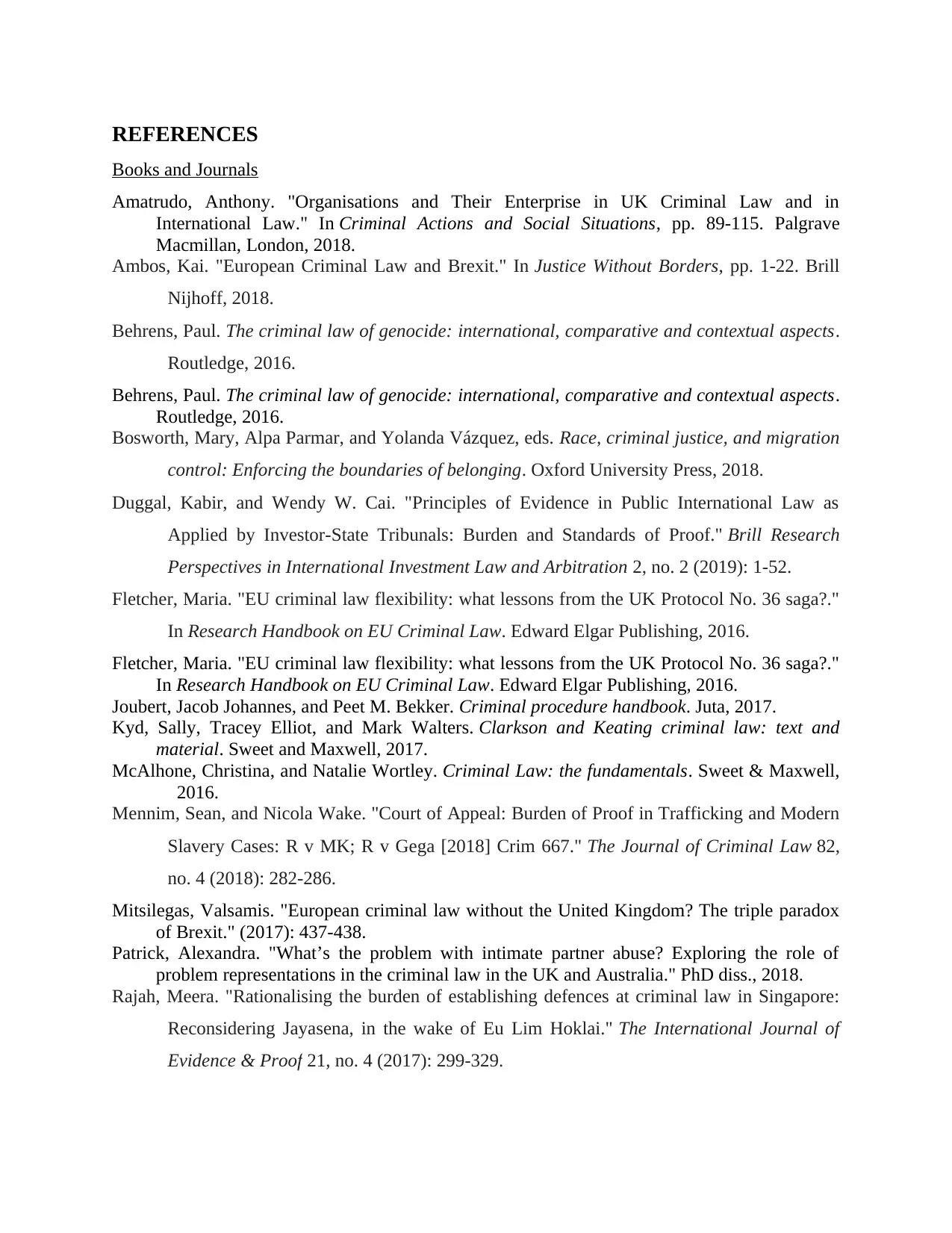
REFERENCES
Books and Journals
Amatrudo, Anthony. "Organisations and Their Enterprise in UK Criminal Law and in
International Law." In Criminal Actions and Social Situations, pp. 89-115. Palgrave
Macmillan, London, 2018.
Ambos, Kai. "European Criminal Law and Brexit." In Justice Without Borders, pp. 1-22. Brill
Nijhoff, 2018.
Behrens, Paul. The criminal law of genocide: international, comparative and contextual aspects.
Routledge, 2016.
Behrens, Paul. The criminal law of genocide: international, comparative and contextual aspects.
Routledge, 2016.
Bosworth, Mary, Alpa Parmar, and Yolanda Vázquez, eds. Race, criminal justice, and migration
control: Enforcing the boundaries of belonging. Oxford University Press, 2018.
Duggal, Kabir, and Wendy W. Cai. "Principles of Evidence in Public International Law as
Applied by Investor-State Tribunals: Burden and Standards of Proof." Brill Research
Perspectives in International Investment Law and Arbitration 2, no. 2 (2019): 1-52.
Fletcher, Maria. "EU criminal law flexibility: what lessons from the UK Protocol No. 36 saga?."
In Research Handbook on EU Criminal Law. Edward Elgar Publishing, 2016.
Fletcher, Maria. "EU criminal law flexibility: what lessons from the UK Protocol No. 36 saga?."
In Research Handbook on EU Criminal Law. Edward Elgar Publishing, 2016.
Joubert, Jacob Johannes, and Peet M. Bekker. Criminal procedure handbook. Juta, 2017.
Kyd, Sally, Tracey Elliot, and Mark Walters. Clarkson and Keating criminal law: text and
material. Sweet and Maxwell, 2017.
McAlhone, Christina, and Natalie Wortley. Criminal Law: the fundamentals. Sweet & Maxwell,
2016.
Mennim, Sean, and Nicola Wake. "Court of Appeal: Burden of Proof in Trafficking and Modern
Slavery Cases: R v MK; R v Gega [2018] Crim 667." The Journal of Criminal Law 82,
no. 4 (2018): 282-286.
Mitsilegas, Valsamis. "European criminal law without the United Kingdom? The triple paradox
of Brexit." (2017): 437-438.
Patrick, Alexandra. "What’s the problem with intimate partner abuse? Exploring the role of
problem representations in the criminal law in the UK and Australia." PhD diss., 2018.
Rajah, Meera. "Rationalising the burden of establishing defences at criminal law in Singapore:
Reconsidering Jayasena, in the wake of Eu Lim Hoklai." The International Journal of
Evidence & Proof 21, no. 4 (2017): 299-329.
Books and Journals
Amatrudo, Anthony. "Organisations and Their Enterprise in UK Criminal Law and in
International Law." In Criminal Actions and Social Situations, pp. 89-115. Palgrave
Macmillan, London, 2018.
Ambos, Kai. "European Criminal Law and Brexit." In Justice Without Borders, pp. 1-22. Brill
Nijhoff, 2018.
Behrens, Paul. The criminal law of genocide: international, comparative and contextual aspects.
Routledge, 2016.
Behrens, Paul. The criminal law of genocide: international, comparative and contextual aspects.
Routledge, 2016.
Bosworth, Mary, Alpa Parmar, and Yolanda Vázquez, eds. Race, criminal justice, and migration
control: Enforcing the boundaries of belonging. Oxford University Press, 2018.
Duggal, Kabir, and Wendy W. Cai. "Principles of Evidence in Public International Law as
Applied by Investor-State Tribunals: Burden and Standards of Proof." Brill Research
Perspectives in International Investment Law and Arbitration 2, no. 2 (2019): 1-52.
Fletcher, Maria. "EU criminal law flexibility: what lessons from the UK Protocol No. 36 saga?."
In Research Handbook on EU Criminal Law. Edward Elgar Publishing, 2016.
Fletcher, Maria. "EU criminal law flexibility: what lessons from the UK Protocol No. 36 saga?."
In Research Handbook on EU Criminal Law. Edward Elgar Publishing, 2016.
Joubert, Jacob Johannes, and Peet M. Bekker. Criminal procedure handbook. Juta, 2017.
Kyd, Sally, Tracey Elliot, and Mark Walters. Clarkson and Keating criminal law: text and
material. Sweet and Maxwell, 2017.
McAlhone, Christina, and Natalie Wortley. Criminal Law: the fundamentals. Sweet & Maxwell,
2016.
Mennim, Sean, and Nicola Wake. "Court of Appeal: Burden of Proof in Trafficking and Modern
Slavery Cases: R v MK; R v Gega [2018] Crim 667." The Journal of Criminal Law 82,
no. 4 (2018): 282-286.
Mitsilegas, Valsamis. "European criminal law without the United Kingdom? The triple paradox
of Brexit." (2017): 437-438.
Patrick, Alexandra. "What’s the problem with intimate partner abuse? Exploring the role of
problem representations in the criminal law in the UK and Australia." PhD diss., 2018.
Rajah, Meera. "Rationalising the burden of establishing defences at criminal law in Singapore:
Reconsidering Jayasena, in the wake of Eu Lim Hoklai." The International Journal of
Evidence & Proof 21, no. 4 (2017): 299-329.
⊘ This is a preview!⊘
Do you want full access?
Subscribe today to unlock all pages.

Trusted by 1+ million students worldwide
1 out of 13
Related Documents
Your All-in-One AI-Powered Toolkit for Academic Success.
+13062052269
info@desklib.com
Available 24*7 on WhatsApp / Email
![[object Object]](/_next/static/media/star-bottom.7253800d.svg)
Unlock your academic potential
Copyright © 2020–2026 A2Z Services. All Rights Reserved. Developed and managed by ZUCOL.





